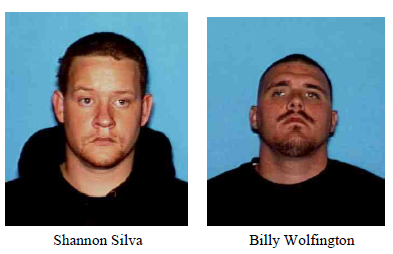
by Antoinnette Borbon
Billy Wolfington, who was recently found guilty of second degree murder, was back in court for a hearing pertaining to case enhancements. Just last month, a Yolo County jury found Mr. Wolfington, the sole named defendant in the 2005 West Sacramento Gang Injunction, guilty of second degree murder.
His co-defendant, Shannon Silva, was acquitted on all charges. Yolo County Deputy DA Ryan Couzens had sought first degree murder charges on both defendants.
Judge Stephen Mock read over all documents regarding Wolfington’s enhancements which included prison priors. Mr. Wolfington’s alleged strike was found to be untrue. He will be sentenced at a later date.
However, before that can occur, Deputy Public Defender Ron Johnson will file a motion for a new trial based on juror misconduct. Mr. Johnson mentioned having to get declarations from a couple jurors. Ryan Couzens reminded Mr. Johnson he needed the discoveries, but he appeared to be aware of the intentions of Mr. Johnson.
The failure to get a second strike is the latest blow to the prosecution in a case that began as a first degree murder trial, with charges against both defendants stemming from the September 2, 2011, stabbing death of 29-year-old Bobby Brittenum.
The prosecutor in the case, Ryan Couzens, who was co-counsel on the Gang Injunction Trial from 2010, was unable to convince the jury that this was a gang crime and the jury found gang enhancements untrue against Billy Wolfington, who was notoriously the sole-named defendant in the original 2005 West Sacramento Gang Injunction.
Mr. Couzens sought to charge both co-defendants with first degree murder, despite huge disparities in the responsibility for the crime.
The jury disagreed and ultimately acquitted Mr. Silva, who witnesses described as exchanging punches with the victim, but was on the other side of the room during the actual stabbing.
The prosecution attempted to argue that Mr. Silva was stabbed by Mr. Wolfington due to his proximity to the stabbing, but that was contradicted by both eyewitness testimony as well as physical evidence showing that blood on Mr. Silva’s shirt was solely his own blood.
The prosecution was hindered by the fact that investigators never found the knife to be able to test it for DNA evidence.
That would seem to preclude an aiding and abetting theory, as Mr. Silva was never close enough to the stabbing to get blood from the victim on his shirt.
The jury apparently did not believe that it was a natural or probable outcome that throwing punches would lead to a stabbing.
While Mr. Wolfington has warded off the worst of the charges, he does not get off scot-free here either. The second degree murder charge carries with it a potential life sentence as it would appear, given Mr. Wolfington’s gang history and his trouble in prison previously, it would be unlikely he would be paroled.
The failure for investigators to find a knife proved detrimental to the prosecution’s case. The prosecution was unable to prove that Mr. Silva was in close proximity to Mr. Wolfington at the start of the fight. Mr. Silva received a slash to his tricep, something that neither side was able to definitively identify how that wound was received.
Had the knife been found with blood from Mr. Silva on it, the prosecution’s theory might have been better proven.
On the other hand, there are theories that there was actually a second knife – one that the victim had.
The defense attempted to argue that Mr. Wolfington was only responding to a threat. Mr. Brittenum said something that was threatening, then attacked Shannon Silva and charged Billy Wolfington, forcing Mr. Wolfington to pull out a knife and end Mr. Brittenum’s life.
The problem is that none of this testimony – in his view – is corroborated by the evidence and it is inconsistent with the blood pattern and wounds. Mr. Couzens would argue that the witnesses’ testimony proved Wolfington was lying about seeing a knife, and lying about the events which led up to the stabbing.
When he had Mr. Wolfington on the stand he showed a picture of his arm from booking, which he claims showed that there was no wound. In closing, Mr. Couzens argued that Mr. Wolfington told a “lie” and said that there was a defensive wound that he didn’t have. He told the jury to look at the photo and they will see no wound.
“He was lying about what happened,” he argued. “You can decide if that amounts to a ‘consciousness of guilt.’ “
He argued that, even if they buy into the defendant’s story about the threat issued by Bobby Brittenum, Mr. Wolfington has to show that he was in imminent danger, and that he had to instantly deal with this danger or face a loss of life.
Mr. Couzens would argue that Billy Wolfington stabbed the victim 17 times, and that if Mr. Brittenum had a knife, Mr. Wolfington would have suffered more than just the superficial wounds on his hand.
In the end, the jury found Mr. Wolfington guilty of killing Mr. Brittenum, but without premeditation and without the gang enhancements.
Mr. Wolfington faces a life sentence when sentencing occurs following Mr. Johnson’s motion for a new trial.




I’m confused. The prior strike enhancement = what exactly? Is this the ‘strike’ of the ‘three strikes’ thing? He was previously found guilty of a crime which was of a serious nature to be defined as the ‘first strike’?
If he was found guilty of a prior strike, how can a judge that is not an appellate court, essentially reverse that ruling by finding it to be untrue?
If this isn’t what you’re referring to, could you tell me what the ‘strike’ is? Sorry, I’m not well educated on this. It sounds like you’re saying that the judge reviewed documents from a previous strike conviction, which would mean that in the legal definition, it’s not alleged, but true, unless reversed by an appellate court.
Prior strike enhancement is part of the three strikes law. A second strike doubles the penalty.
Judge Mock apparently determined that he did not get previously convicted of a strikable offense.
“…given Mr. Wolfington’s gang history…”
I had to read this over several times. Is it possible – is it truly possible – that David Greenwald has acknowledged that Mr. Wolfington is a member of a gang? I thought gangs didn’t exist in David’s world! Misunderstood youth, each acting entirely alone in their criminal conduct, who all just by sheer happenstance tend to prefer to attire themselves in the same colors. Certainly not the Broderick Boys……
No, wait. It must have been one of David’s interns that wrote this article. Let’s hope the editorial staff catches such a heretical mistake in the future.
Please show me where I have ever said gangs don’t exist.
Lingua in maxillam, David.
Throughout your various articles, you have had a definite “head in the sand” viewpoint towards gangs, particularly towards the Broderick Boys. As a reader, one can’t tell whether this is done as an intentional counterpoint to Herr Reisig’s extreme unethical and overreaching practices. But your position towards gangs is, nevertheless, equally as far from reality as Reisig’s, but on the other end of the spectrum.
My general view on gangs probably better fits into a commentary rather than a comment but I’ll say two things.
First, I think we treat a long of marginal gang members using laws designed to deal with LA and Oakland gang members.
Second, I think the 186.22 Penal Code has allowed DA’s tremendous latitude in introducing prejudicial evidence that would otherwise not be allowed into the penal code.
Third, I think the Wolfington case is a good illustration that not every bad act committed by a gang member is a gang crime.
Fourth, I think we’ve created a gang injunction to treat crimes that mostly are not gang crimes and thus will not have much impact on the problems of West Sacramento.
It’s not that I don’t think gangs exist, it’s simply that I don’t believe that the majority of the crimes depicted in the gang injunction show the level of concerted action and conspiracy that the term gang would suggest.
In defense of David, I don’t think he’s said gangs don’t exist, I think he’s raised intelligent questions as to how they are defined, and how the laws/prosecution concerning alleged gang members are handled. Even horrible people deserve due process. He’s pointed out that the DA’s office overreaches. And he’s right.
the Yolo court overreached on the gang injunction, therefore the ruling was struck down by higher courts.
Mr. Silva, who admitted assault and battery, now has no conviction associated with this crime. He served a year and a half in jail awaiting a murder trial, but he now has no conviction for his role, which although did not appear to be that of murder, was certainly assault and battery.
Had the DA’s office not overreached, perhaps Mr. Silva would now have a criminal record. If he IS a gang member, and depending on his future acitivities, that might have been a good thing.
A competent DA might have prosecuted what they could prove, and what the facts of the case pointed to.
Does Mr. Silva getting off without any conviction for assault make us all safer?
I don’t always agree with David, but the reason we’re reading this forum, is because it’s a heck of a lot better than other sources of information.
Re: “First, I think we treat a lot of marginal gang members using laws designed to deal with LA and Oakland gang members.”
From what I’ve gathered, I would agree with David that the West Sac gang problem is not on the level of the situations in LA and Oakland. One could make an argument that vigilant police and prosecution action have helped to prevent the gang problem from getting worse–chronic serious thuggery and gang-takeover of West Sac nipped in the bud!
That’s an interesting point, but how about another. Wolfington ends up going from a relatively minor crime to a VOP in which he was selling drugs to the drop out yard at High Desert. The drop out yard ends up being as tough as any place and he ends up becoming a guy who is not only a gang member, but a very dangerous one. So while it’s possible that you could argue tough police and prosecution action could nip stuff in the bud, it could also cultivate much more dangerous criminals who end up being churned out by the system much more dangerous than when they got in.
David,
You make a good point; and I agree that I do not like the way prisons are run. Somehow the prisoners have enough free time and energy to continue in their criminal endeavors and polishing of criminal skills.
I’ve stated before on this forum how I think prisons can be reformed so that inmates are not further degraded, and have a real chance to redeem themselves if they want to. This includes restricted group size social interactions; so that prisoners are not obliged to join prison gangs for protection, and also prisoner choice on whether they want to have social time with small or large (guarded) groups during social hours; so they can feel protected. And also more options on work: work hours count towards early release; and also payment of minimum wage, most of which becomes available to them only after release (so it can’t be extorted from them in prison; exceptions if sent to spouse/family). Not only will work keep them too busy (and too tired after work) to brew trouble; but they will have a nest egg of money waiting for them after release; so they have time to get back on their feet by finding a job, and are less likely to turn back to crime to support themselves.
Did we ever see the conclusion to this? What happened in the next trial?
He was sentenced to 15 to life, I’m pretty sure.
Thank you for the update.